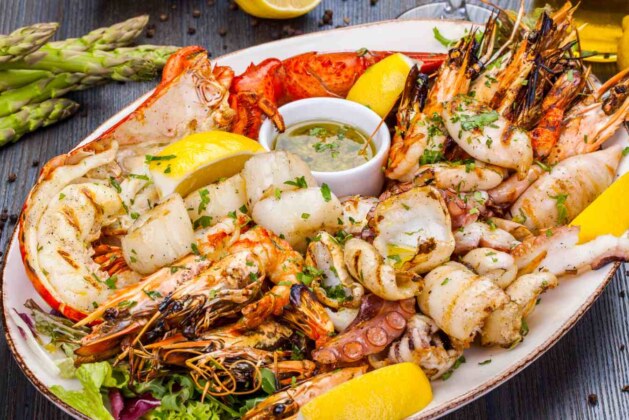[ad_1]
Do foods also contain toxins? Hearing does not believe. For the food we eat, we think that it will benefit our body, not harm. Although you have sometimes heard people who know about balanced nutrition and weight say this, but you don’t believe it. Because so far the research or research that is done on food has not been able to confirm that toxins are also present in food. But some recent research and studies agree on this. Citing various studies, we will tell you about the toxins in food that are only found in your food.
Here are 6 toxins that may be in your diet
Various studies have shown that 6 foods can contain toxins.
1 bisphenol A (Bisphenol A)
Do you use a lot of packaged food? If yes, then you need to be careful about it. This chemical is found on the inside walls of canned goods and drinks.
According to a 2017 study published in the National Library of Medicine’s PubMed Central, bisphenol A, which is found in canned food, has also been found in the placenta and fetuses of women. Its accumulation in the body can affect the DNA and liver.
Ingested in food or drink, it can mimic estrogen by binding to the hormone’s receptor sites. This can affect the work of hormones. Some studies suggest that it may affect the developing fetus and increase the risk of prostate cancer. In some cases, it contributes to type 2 diabetes and obesity by increasing insulin resistance.
To avoid this, it is necessary to avoid plastic and aluminum containers, bottles as much as possible. Instead, eat foods or drinks packaged in glass or stainless steel.
-
artificial oil (artificial trans fat)
Here again we are talking about processed and packaged food. In fact, artificial trans fat is used in the preparation of many types of snacks, such as donuts, baked goods, cookies, pizza, cookies, crackers, margarine.
A hydrogen pump is used to turn a liquid vegetable oil such as soybean or peanut oil into a solid, artificial trans fat.
According to the American Heart Association, it increases bad cholesterol and lowers good cholesterol. This increases the risk of heart disease and stroke. It also causes inflammation. Therefore, as of January 2020, the use of artificial trans fats has been completely banned in the United States.
-
polycyclic aromatic hydrocarbons (polycyclic aromatic hydrocarbons)
Are you grilling meat at high temperatures to feed your family? If so, know that you are also sending toxins like polycyclic aromatic hydrocarbons to your dinner plate. However, polycyclic aromatic hydrocarbons (PAHs) are considered environmental pollutants. It is produced by burning organic matter. Hence its presence in our food.
When meat is grilled or smoked at high temperatures, the fat drips into the hot cooking atmosphere and produces aromatic volatile polycyclic hydrocarbons, which can also leach into the meat.
It is also found in processed food. According to the guidelines of the World Health Organization, due to pollution, there is a possibility of breast, kidney, colon, prostate and lung cancer. If you cook on low heat, then the pH should be Can reduce up to 89%.
-
coumarin in cinnamon ,coumarin in cinnamon)
Coumarin is a toxic compound found in cinnamon. Consuming it in large amounts increases the risk of cancer and liver damage. It’s impossible to know how much coumarin is in cinnamon until you try it.

One study found that children who regularly sprinkle cinnamon powder on their oatmeal may have dangerous levels of coumarin. If you regularly consume cinnamon, then you should be aware of it.
-
add sugar (Added Sugar)
Added sugar, used to enhance the flavor and shelf life of food, is linked to an increased risk of diabetes, heart disease and cancer, a Harvard University study reports. If you consume processed foods such as soft drinks, flavored yogurt, cookies, cakes, candy, ketchup, etc. on your own or serve them to your family, you also know important things about them.
Added sugar is also called empty calories. The high fructose found in these sugars increases the risk of obesity, type 2 diabetes, metabolic syndrome, fatty liver disease, and cancer. Limit sugary drinks and canned fruit juices to reduce your intake of added sugars. Eat very little processed snacks and sweets.
-
mercury in fish (Mercury in fish)
Fish is a healthy animal protein, but some types of deep-sea fish can contain high levels of mercury or mercury. This is a toxic compound. Due to water pollution, this toxin enters the food chain in the ocean.
Plants growing in mercury-contaminated water are eaten by smaller fish, which are then eaten by larger fish. Over time, mercury accumulates in the body of that large fish. By eating this fish, this mercury reaches people. Mercury is a neurotoxin that can damage the brain and nerves.
Mercury can affect the development of the nervous system of the fetus and child
Research shows that young children and pregnant and lactating women are especially at risk. This mercury can affect the development of the brain and nervous system of the fetus and child. King mackerel and swordfish are high in mercury. Salmon, pollock, herring and fish can be consumed due to their low mercury content.

Minimize consumption of packaged foods, trans fats and added sugars as much as possible to reduce risk.
[ad_2]



Leave a comment